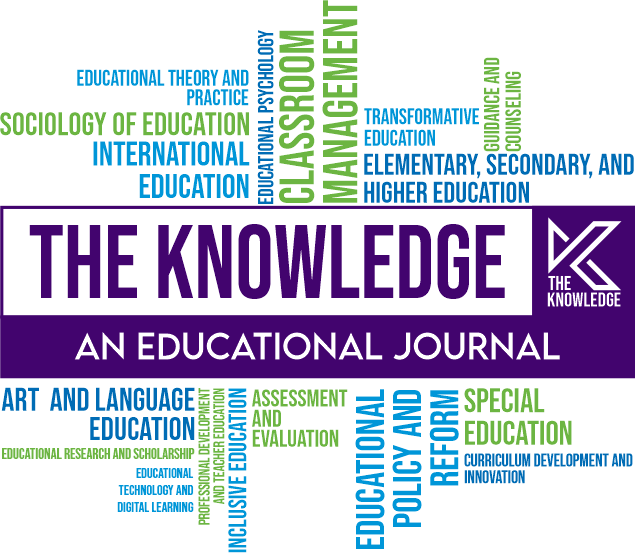Exploring the Darker Side of Motivation: A Qualitative Inquiry into English Learning Demotivators
DOI:
https://doi.org/10.55737/tk/2k25c.43081Keywords:
English Language Learning Motivation, Demotivation, Qualitative ResearchAbstract
The present study was an attempt to explore potential demotivators that enervate students’ motivation in learning English. This qualitative study included a total number of twelve college students to garner their overall experiences in English learning. The data were collected through semi-structured interviews, which lasted 15 to 20 minutes each. The knowledge extracted from these interviews provided deep insight into the demotivation mechanism of Pakistani English learners. The recorded interviews were transcribed and organized for final analysis. The recordings were listened to and re-listened to ensure the authenticity of the transcriptions. To establish themes and sub-themes, the text was coded through thematic analysis to determine categories of demotivators. The steps suggested by Braun and Clarke (2006) were followed to analyse the data. The findings revealed that there were four major themes leading to students’ language learning demotivators: lack of interest, experiences of failure, characteristics of classes, and classroom environment. The emerged themes also complemented the findings on the causes of demotivation explored in different social and learning contexts. The implications of the study are also discussed.
References
Aydin, S. (2012). Factors causing demotivation in the EFL teaching process: A case study. The Qualitative Report, 17(51), 1-13. https://doi.org/10.46743/2160-3715/2012.1696
Bahramy, M., & Araghi, M. (2013). The identification of demotives in EFL university students. International Journal of Basic and Applied Science, 1(4), 840-845.
Braun, V., & Clarke, V. (2006). Using thematic analysis in psychology. Qualitative Research in Psychology, 3(2), 77-101. https://doi.org/10.1191/1478088706qp063oa
Çankaya, P. (2017). Demotivation factors in foreign language learning. Journal of Foreign Language Education and Technology, 3(1), 1-17. https://www.ceeol.com/search/article-detail?id=781953
Cohen, L., Manion, L., & Morrison, K. (2013). Research methods in education. London: Routledge.
Creswell, J. W. (2012). Educational research: Planning, conducting, and evaluating quantitative and qualitative research (3rd ed.). Upper Saddle River, NJ: Pearson Education.
Creswell, J. W. (2014). Research design: Qualitative, quantitative, and mixed methods approaches. Thousand Oaks, CA: Sage.
Denzin N., & Lincoln. (2000). Handbook of qualitative research. London: Sage
Dinius, S. M. (2013). Malaysian student demotivation in learning English: The impact of conscientiousness (Doctoral dissertation, Northcentral University, Scottsdale, America). Available from ProQuest Dissertations & Theses Global.
Dörnyei, Z. (2001). Motivational strategies in the language classroom. Cambridge: Cambridge University Press.
Dörnyei, Z., & Ryan, S. (2015). The psychology of the language learner revisited. Routledge.
Dörnyei, Z., & Ushioda, E. (2013). Teaching and researching motivation: (3rd ed.). Harlow, UK: Longman.
Dörnyei. Z. (2007). Research methods in applied linguistics: quantitative, qualitative and mixed methodologies. Oxford: Oxford University Press.
Falout, J., Elwood, J., & Hood, M. (2009). Demotivation: Affective states and learning outcomes. System, 37(3), 403-417. https://doi.org/10.1016/j.system.2009.03.004
Gay, L. R., & Mills, G. E. (2009). Educational Research: Competencies for Analysis and Applications, Global Edition: Upper Saddle River, NJ: Pearson Education.
Gay, L. R., & Mills, G. E. (2015). Educational Research: Competencies for Analysis and Applications, Global Edition: Upper Saddle River, NJ: Pearson Education.
Ghonsooly, B., Hassanzadeh, T., Samavarchi, L., & Hamedi, S. M. (2017). A mixed-methods approach to demotivating factors among Iranian EFL learners. Issues in Educational Research, 27(3), 417–434. https://search.informit.org/doi/10.3316/ielapa.008004935676488
Hamada, Y. (2008). Demotivators for Japanese Teenagers. Journal of Pan-Pacific Association of Applied Linguistics, 12(2), 1-23.
Hamada, Y. (2011). What demotivates and what prevents demotivation. Annual Research Report on General Education of Akita University, 3, 59-68. https://cir.nii.ac.jp/crid/1520290884518899200
Hosseini, S. A., & Jafari, S. M. (2014). Possible demotivating factors for secondary school students. International Journal of Language Learning and Applied Linguistics World, 5(3), 188-201.
Jahedizadeh, S., Ghanizadeh, A., & Ghonsooly, B. (2016). The role of EFL learners’ demotivation, perceptions of classroom activities, and mastery goal in predicting their language achievement and burnout. Asian-Pacific Journal of Second and Foreign Language Education, 1(1), 1-17. https://doi.org/10.1186/s40862-016-0021-8
Kikuchi, K. (2011). Learner perceptions of demotivators in japanese high school english classrooms (Doctoral dissertation, Temple University). Available at ProQuest Central; ProQuest Dissertations & Theses Global. (Order No. 3477768).
Kim, T. Y., & Seo, H. S. (2012). Elementary School Students' Foreign Language Learning Demotivation: A Mixed Methods Study of Korean EFL Context. Asia-Pacific Education Researcher (De La Salle University Manila), 21(1), 160–171.
Li, L. (2011). Why They Loathe Learning English? A Study on Chinese College EFL Learners' Demotivators. In Information Management, Innovation Management and Industrial Engineering (ICIII), 2011 International Conference on (Vol. 3, pp. 555-560). IEEE.
Li, C., & Zhou, T. (2017). A questionnaire-based study on Chinese University students’ demotivation to learn English. English Language Teaching, 10(3), 128-135. https://doi.org/10.5539/elt.v10n3p128
Li, C., & Zhou, T. (2017). An exploratory study on the relationship between demotivation and academic fields among Chinese EFL learners. Arab World English Journal, 8(1), 42-54. https://doi.org/10.24093/awej/vol8no1.4
Meshkat, M., & Hassani, M. (2012). Demotivating Factors In Learning English: The Case Of Iran. Procedia - Social and Behavioral Sciences, 31, 745–749. https://doi.org/10.1016/j.sbspro.2011.12.134
Mohammadi, N., Ghorbani, V., & Hamidi, F. (2011). Effects of e-learning on language learning. Procedia Computer Science, 3, 464-468.
Newby, P. (2010). Research methods for education. Abingdon: Routledge.
Sahragard, R., & Ansaripour, E. (2014). Demotivating and Remotivating Factors among MA Students of TEFL: An Iranian Case. International Journal of Society, Culture & Language, 2(1), 88–105. https://www.ijscl.com/article_4502.html
Sakai, H., & Kikuchi, K. (2009). An analysis of demotivators in the EFL classroom. System, 37(1), 57-69. https://doi.org/10.1016/j.system.2008.09.005
Sharififar, M., & Akzarbadeh, M. (2011). An analysis of demotivators in English classes for Iranian university students. Iranian EFL Journal, 7(2), 28-40.
Tomlinson, B. (2012). Materials development for language learning and teaching. Language Teaching, 45(2), 143-179. https://doi.org/10.1017/s0261444811000528
Unal, K., & Yanpar, Y. T. (2016). Turkish students’ demotivation to study English: A scale development. Croatian Journal of Education, 18(3), 755-777. https://doi.org/10.15516/cje.v18i3.1661
Downloads
Published
Issue
Section
License
Copyright (c) 2025 Copyright in the THE KNOWLEDGE is retained by the author(s). Authors also grant any third party the right to use the article freely as long as its integrity is maintained and its original authors, citation details and publisher are identified.
This work is licensed under a Creative Commons Attribution-NonCommercial 4.0 International License.







